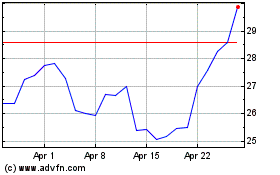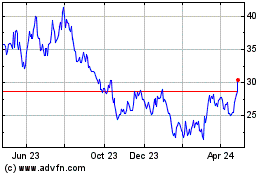By Julie Wernau
Two months into the coronavirus epidemic in China, tens of
millions of people are still under quarantine and much of the
economy remains in a deep freeze.
Yet China has largely succeeded in keeping its stores filled
with food and other essentials -- even in hard-hit places like the
city of Wuhan -- a crucial factor in maintaining public order
throughout the crisis.
To do that, China relied on mandates from central authorities
against hoarding and profiteering. Private companies, including
JD.com Inc. and Walmart Inc., rerouted trucks and located supplies
that otherwise might not have made it to market.
After Beijing called for an increase in face mask production,
manufacturers canceled holidays for workers and jacked up wages to
increase production of basic medical supplies. When Beijing issued
orders against price gouging, companies looked for sudden price
spikes and cut off guilty shopkeepers, or found ways to make more
products available.
Shopping app Pinduoduo Inc. got more farmers to use their online
marketplaces, enabling them to sell more widely. By targeting
soon-to-expire foods that might ordinarily have been thrown away by
suppliers, Walmart was able to locate a massive batch of cucumbers
in Yunnan province. Staff members worked through the night at a
distribution center to test and sort the cucumbers for delivery to
stores the next morning.
"The only element of physical commerce that really stayed close
to normal is the supermarket," said Michael Norris, a
Shanghai-based research and strategy manager at Agency China, a
market research firm. "The supermarket has really been the
lifeblood of the community during this event."
Other countries, including the U.S. and Japan, are grappling
with how to keep supplies available as the coronavirus spreads. In
the U.S., supermarkets have rationed some items and are considering
cutting operating hours and tapping volunteers to deliver food.
It isn't clear if other countries will want to go as far as
China, whose central government intervenes often in commerce. China
has also had problems of its own making to deal with -- including
navigating the rigid quarantine restrictions enacted by
Beijing.
Panic buying did appear in some parts of the country and some
products have remained in short supply. There was also some luck in
the epidemic's timing, since many households were stocked up for
the Lunar New Year holiday.
Food inflation countrywide rose 21.9% in February from a year
earlier. But much of the increase was due to pork prices, which
have been battered by African swine fever.
It could have been worse. Lu Jie, who runs a small shop in
Beijing selling everything from Twix bars to dried fruits, said she
initially had to rely on supplies left over from the prior season.
Many products couldn't get into Beijing because of quarantine
restrictions.
This week, she said, more of her old suppliers were reappearing,
as trucks found more ways to get through roadblocks. With business
still slow, she said she already had most of what she needed.
A few weeks earlier, it seemed likely that China would endure
crippling goods shortages.
So many people in rural areas were forbidden to enter and exit
their communities that vegetables couldn't be shipped out. Some
places disallowed harvesting of certain foods outright, including
green onions and cauliflower, citing a need to contain the
epidemic.
Roads became nearly impassable due to government blockades. Many
truck drivers were forced into quarantine because they had been in
exposed areas. Food shipments dropped dramatically at ports, with
international deliveries canceled.
In response, China's government released more than 300,000 tons
of pork from central and local strategic reserves, adding more meat
to the market.
Relying on a Ministry of Commerce emergency commodity database,
authorities reached out to hundreds of businesses to gather
information about supplies of rice, vegetables and other products,
and began connecting buyers with available sellers.
To make sure goods got through roadblocks, the government
established a "green channel" system that allowed truck drivers to
travel between cities with special passes. Some local governments
hired truck drivers to keep supplies flowing.
The city of Chongqing, in central China, hired a local trucking
firm called Circle Logistics Co. that normally serves factories
operated by Foxconn Technology Group and Corning Inc. to deliver
vegetables, drugs and face masks, said Robin Zheng, its owner.
"Moving vegetables isn't our usual work," said Mr. Zheng. "But
this is the job right now: delivering food."
To ensure buyers didn't hoard and store owners didn't engage in
price-gouging, Beijing announced strict prohibitions on such
activities, while some local governments punished outlets that
jacked up prices. Costco Wholesale Corp. and other grocery chains
agreed to limit the number of customers allowed into stores and to
stop selling some popular products to lower store visits.
Jingkelong Supermarket in Beijing set up lines for customers to
enter, with each person standing one meter apart. Customers were
given cards to return upon exit, allowing another person to
enter.
Pinduoduo, which is especially popular among consumers in
smaller cities, promoted a recently-created platform that helps
farmers find alternative buyers. Ning Qiang, a 32-year-old
businessman from Sichuan province, used the service after figs he
sourced from farms -- which can only survive for 10 days after they
are picked -- went unsold during the Lunar New Year. He eventually
found buyers.
JD.com said when inventories in its warehouses for products like
rice, flour and oil started getting tight, it was able to source
additional supplies from offline businesses -- including mom and
pop stores -- that were open and closest to customers. In many
cases, an order on JD.com was supplied by a courier coming directly
from the customer's local convenience store.
Alibaba Group Holding Ltd. said its various food-delivery
platforms hired thousands of people who were unable to return to
their usual jobs and put them to work delivering supplies to
people. At one point when all roads were blocked in an area where a
father who was desperate for baby formula lived, sorting station
manager Ning Yang carried the baby formula herself, walking more
than two kilometers to deliver it to the buyer's door.
--Xiao Xiao and Trefor Moss contributed to this article.
Write to Julie Wernau at Julie.Wernau@wsj.com
(END) Dow Jones Newswires
March 13, 2020 05:45 ET (09:45 GMT)
Copyright (c) 2020 Dow Jones & Company, Inc.
JD com (NASDAQ:JD)
Historical Stock Chart
From Mar 2024 to Apr 2024

JD com (NASDAQ:JD)
Historical Stock Chart
From Apr 2023 to Apr 2024
